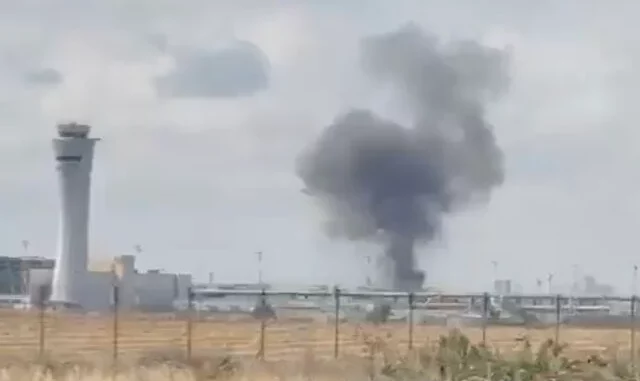
Smoke in the area of Ben Gurion Airport after a ballistic missile was fired at Israel from Yemen on May 4, 2025 (Screen grab from social media used in accordance with Clause 27a of the Copyright Law)
| Published May 4, 2024
a hypersonic ballistic missile launched by Yemen’s Houthi rebels struck near Israel’s Ben Gurion International Airport, marking a significant escalation in the regional conflict. The missile impacted close to Terminal 3, causing injuries to several individuals and disrupting airport operations.
Key Details:
-
Injuries and Damage: Reports indicate that between four to eight people sustained injuries, ranging from mild to moderate. The missile created a substantial crater near the airport’s access road, leading to temporary suspension of flights and closure of surrounding roads.
-
Defense System Failure: Despite attempts by Israel’s Arrow and the U.S.-supplied THAAD missile defense systems to intercept the projectile, the missile was not neutralized, raising concerns about the effectiveness of these defense mechanisms against advanced threats.
-
Houthi Statement: The Iran-backed Houthis claimed responsibility for the attack, stating it was in solidarity with Palestinians in Gaza and warning that Israeli airports are no longer safe for air travel.
-
Israeli Response: Israeli Defense Minister Israel Katz vowed a strong retaliation, asserting that any harm to Israel would be met with a sevenfold response.
-
International Repercussions: The attack led to flight cancellations and delays, with airlines such as Air India, TUS Airways, and Lufthansa Group affected. The incident also prompted discussions on the security of international air travel in conflict zones.
This event underscores the escalating tensions in the Middle East and the potential for broader regional involvement in the ongoing conflict.
🔴 Implications of the Houthi Missile Attack on Israel’s Ben Gurion Airport
🟦 1. Heightened Regional Instability
-
The missile strike marks a significant escalation in the conflict between Yemen’s Houthi rebels and Israel, potentially drawing in more regional actors. The Houthis’ direct involvement in the Israel-Palestinian conflict shows the growing proxy war dynamics involving Iran-backed factions.
-
This could further destabilize the broader Middle East, with other regional powers like Iran, Saudi Arabia, and the UAE potentially increasing their involvement in support of either side.
🟦 2. Security Concerns for International Air Travel
-
The missile strike near a major international airport highlights the vulnerability of air travel in conflict zones. Airlines may reconsider routes to and from Israel, affecting global aviation security and increasing insurance premiums for flights over Middle Eastern airspace.
-
Countries with diplomatic ties to Israel might feel pressure to bolster their own security measures for international flights transiting near or through Israeli airspace.
🟦 3. Weaknesses in Israeli Defense Systems
-
Despite Israel’s cutting-edge missile defense systems like Arrow and THAAD, the attack raised questions about their effectiveness against hypersonic and sophisticated missile threats. This failure may lead to increased investments in defense technologies or calls for improved cooperation with allies (such as the U.S.) to upgrade defense systems.
-
The attack will likely prompt a reevaluation of Israel’s defense capabilities, especially as missile technology continues to evolve.
🟦 4. Escalating Tensions with Iran
-
Iran’s role in backing the Houthis increases the likelihood of direct retaliation from Israel against Iranian interests or proxies in the region.
-
Israel may perceive this as an Iranian provocation, further complicating the already tense relationship between Israel and Iran. This could lead to military escalation between the two countries and heighten the risks of a broader regional war.
🟦 5. International Reactions and Diplomatic Pressure
-
The missile attack could put diplomatic pressure on global powers, particularly those in the U.S. and Europe, to play a more active role in de-escalating the situation.
-
Global condemnation of the missile attack may intensify, but countries with close ties to Yemen or Iran may downplay the incident or frame it as a response to Israeli actions in Gaza.
⚪ 6. Humanitarian Impact
-
If the conflict continues to escalate, the humanitarian situation in Gaza and Yemen could worsen, drawing more international attention and aid efforts.
-
Both sides will likely use the attack as a justification for further military action, leading to more civilian casualties and exacerbating the ongoing humanitarian crises.
✅ Overall Takeaway
The Houthi missile strike near Israel’s Ben Gurion Airport marks a dangerous escalation in the Middle Eastern conflict, highlighting the growing involvement of Iranian-backed forces and the vulnerabilities of international air travel in conflict zones. This attack raises serious security concerns about Israel’s defense systems and regional stability, potentially drawing in more players like Iran, Saudi Arabia, and other global powers. As tensions rise, military retaliation seems likely, further complicating the humanitarian crisis in Gaza and Yemen, and raising the stakes for global diplomatic efforts in the region.
SOURCES: THE JERUSALEM POST – WATCH: Houthi missile crashes at airport in first since war began as IDF fails at interception
GMA NEWS ONLINE – Missile fired by Yemen’s Houthis lands near Israel’s main airport
NEWSMAX – Missile Fired by Yemen’s Houthis Lands Near Israel’s Main Airport
THE TIMES OF ISRAEL – Ballistic missile fired by Houthis apparently impacts in area of Ben Gurion Airport; no injuries reported





Be the first to comment